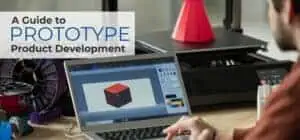
Prototype product development is a crucial phase in transforming innovative ideas into tangible products. It allows designers, engineers, and entrepreneurs to refine their concepts, test functionality, and gather valuable user feedback before investing significant resources into full-scale production. In this comprehensive guide, we will explore the essential steps involved in prototype product development and discuss the importance of leveraging product design services to enhance the process. Throughout the article, we will highlight the keywords “Prototype Product Development” and “Product Design Services” to provide you with valuable insights into this dynamic field.
Understanding Prototype Product Development
Prototype product development refers to the iterative process of creating physical or digital models that represent the envisioned product. These prototypes act as early versions of the final product and enable designers and engineers to validate their ideas, assess functionality, and identify potential areas for improvement.
Importance of Prototype Product Development
Prototype product development offers numerous benefits, including:
- Validating design concepts: Prototypes allow designers to visualize their ideas and test their feasibility, functionality, and aesthetics.
- Refining designs: Prototypes facilitate iterations and refinements, helping to optimize product features and eliminate design flaws.
- Gathering user feedback: Prototypes provide opportunities to gather valuable feedback from potential users, allowing for improvements based on real-world insights.
- Attracting investors and stakeholders: High-quality prototypes can significantly enhance the chances of securing funding and gaining support from stakeholders.
Key Steps in Prototype Product Development
Conceptualization and Ideation: The initial step involves brainstorming ideas, conducting market research, and defining product specifications. Here, product design services play a vital role in translating concepts into feasible designs by considering user needs, industry trends, and technical requirements.
Design and Engineering: Once the concept is finalized, designers and engineers collaborate to create detailed 2D or 3D designs using computer-aided design (CAD) software. This stage involves considering factors like materials, manufacturing processes, and regulatory compliance.
Proof of Concept (POC) Prototype: A Proof of Concept (POC) prototype is a basic version of the product designed to test key functionalities and verify technical feasibility. Product design services assist in rapidly creating POC prototypes using technologies like 3D printing or digital simulation.
Alpha Prototype: The alpha prototype is a more refined version that closely resembles the final product in terms of aesthetics and functionality. Product design services help in refining the design, selecting appropriate materials, and ensuring proper ergonomics.
Beta Prototype: The beta prototype is a near-production-ready version used for extensive testing and validation. It focuses on user experience, durability, and manufacturability. Product design services aid in fine-tuning the design, making improvements based on user feedback, and preparing for mass production.
Manufacturing Prototype: The manufacturing prototype represents the final design before mass production. Product design services assist in finalizing the design, optimizing for production processes, and creating detailed manufacturing specifications.
Leveraging Product Design Services
There are many ways to leverage product design services. Here are a few examples:
- Outsource the entire product design process: This is a great option for businesses that don’t have the in-house resources to design their own products. Outsourcing can save you time and money, and it can give you access to a team of experienced designers who can help you create a product that meets your needs.
- Hire a product design consultant: A consultant can help you with specific aspects of the product design process, such as user research, ideation, or prototyping. This can be a great way to get expert advice without having to commit to outsourcing the entire process.
- Take a product design course. There are many online and in-person courses that can teach you the basics of product design. This can be a great way to learn the skills you need to design your own products or to improve your skills if you’re already a designer.
No matter which approach you choose, leveraging product design services can help you create a better product that meets the needs of your users.
Here are some of the benefits of leveraging product design services:
- Access to expertise: A team of experienced designers can bring a wealth of expertise to the table, which can help you create a product that is both user-friendly and visually appealing.
- Save time and money: Outsourcing the product design process can save you time and money, especially if you don’t have the in-house resources to do it yourself.
- Improved quality: A team of experienced designers can help you create a product that is of the highest quality, both in terms of its functionality and its appearance.
If you’re considering leveraging product design services, there are a few things you should keep in mind:
- Be clear about your goals. Before you start working with a design team, it’s important to be clear about your goals for the product. What do you want the product to do? Who is your target audience? What are your budget and timeline constraints?
- Find a team that is a good fit for your needs. There are many different types of design firms, so it’s important to find one that is a good fit for your specific needs. Consider the size of the firm, the type of work they do, and their experience with products like yours.
- Be involved in the process. While it’s important to let the design team do their job, you should also be involved in the process. This will help ensure that the final product meets your needs and expectations.
Leveraging product design services can be a great way to create a better product that meets the needs of your users. By following these tips, you can increase your chances of success.